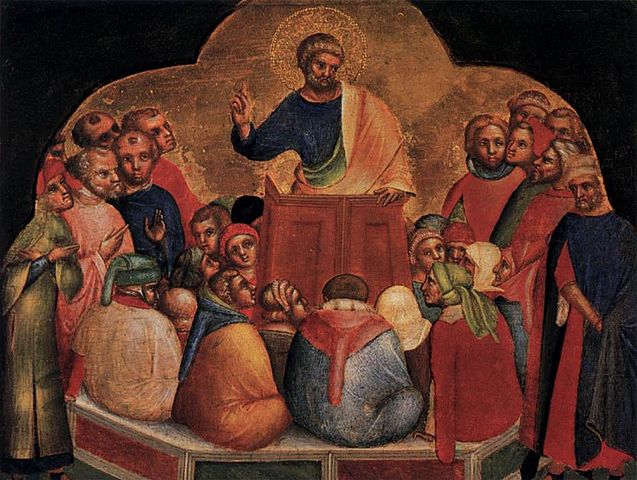
I. THE WORD
The English gospel is derived from the Anglo-Saxon godspell, which meant “good tidings” and later, the “story concerning God.” Gospel is the usual English translation, in the New Testament, of the Greek euangelion (pronounced yoo-ang-GHEL-ee-on), from which, in turn, we get our English words evangelical, evangelist, etc. The Greek euangelion means, literally, “good message” or “good news.” Seven definitions from standard Protestant reference works, follow:
In the N.T. it denotes the good tidings of the Kingdom of God and of salvation through Christ, to be received by faith, on the basis of His expiatory death, His burial, resurrection, and ascension, e.g., Acts 15:7; 20:24; I Peter 4:17. (Expository Dictionary of New Testament Words, W. E. Vine, Old Tappan, New Jersey: Fleming H. Revell, 1940, under heading “Gospel”)
The term comprises the preaching of (concerning) Jesus Christ as having suffered death on the cross to procure eternal salvation for men in the kingdom of God, but as restored to life and exalted to the right hand of God in heaven . . . it may be more briefly defined as ‘the glad tidings of salvation through Christ; the proclamation of the grace of God manifested and pledged in Christ.’ (Rom. 1:16; 10:16; 11:28; I Cor. 4:15; II Cor. 8:18; Gal. 2:2; Eph. 3:6; Phil. 1:5, etc.). (Greek-English Lexicon of the New Testament, Joseph H. Thayer, Grand Rapids, Michigan: Baker Book House, 1901, 257)
The gospel is the good news that God in Jesus Christ has fulfilled His promises to Israel, and that a way of salvation has been opened to all . . . The use of ‘Gospels’ as a designation of the first four books of the N.T. is post-biblical (2nd century A. D.). (New Bible Dictionary, edited by J. D. Douglas, Grand Rapids, Michigan: Eerdmans, 1962, 484)
The central content of the Christian revelation, the glad tidings of redemption. Hence Christ’s own preaching is a ‘Gospel’ (Mk. 1:14 f.). The use of the word in Christian vocabulary probably comes from the OT . . . Is. 61:1 . . . (The Oxford Dictionary of the Christian Church, 2nd edition, edited by F. L. Cross and E. A. Livingstone, Oxford University Press, 1983, 583)
The message of God’s redemption in Jesus Christ, which lies at the heart of the NT and the church’s faith. In the NT it is, first, the proclamation by Jesus that the kingdom has drawn near and, then, the proclamation by His disciples that in His life, death, and resurrection the kingdom has been established and that salvation and forgiveness are offered to all who believe. (The New International Dictionary of the Christian Church, general editor: J. D. Douglas, Grand Rapids, Michigan: Zondervan Publishing House, 1974, 424)
Good news, specifically the good news of salvation through Jesus Christ (Matt. 11:5 par. Luke 4:18; Heb. 4:2,6; 1 Pet. 1:12 . . . Paul most thoroughly treats the nature of the gospel . . . For Paul, the ‘good news’ was that God had bought salvation through the death of Jesus Christ independent of the rules and regulations that characterized Judaism . . . The apostle Paul . . . proclaimed the incarnate, crucified, and resurrected Christ (Rom. 1:3; 1 Cor 1:17) who appeared to his followers after his resurrection (15:1-8) . . . Paul stressed that the gospel is God’s power unto salvation for all believers, manifesting the righteousness of God, but veiled to all those who do not believe (Rom. 1:16-17; cf. 2 Cor. 4:3-4). (The Eerdmans Bible Dictionary, edited by Allen C. Myers, Grand Rapids, Michigan: Eerdmans, 1987; based on Bijbelse Encyclopedie, edited by W. H. Gispen, Kampen, the Netherlands, revised edition, 1975; 432-433)
Two passages summarize the content (Rom. 1:1 ff. and 1 Cor. 15:1 ff.), and cf. Rom. 2:16; 16:25; 2 Tim. 3:8. From Rom. 1:1 ff. we learn that the preexistent Son has become man, is as such the expected Davidic Messiah, and has been exalted as kyrios with his resurrection. The resurrection presupposes the death and passion. As the message of Jesus, the gospel brings peace (Eph. 6:15), but judgment is also part of its content (Rom. 2:16). The gospel also brings strength (Rom. 16:25) as the revelation of God’s saving counsel concurrent with the preaching of Jesus. (Theological Dictionary of the New Testament, edited by Gerhard Kittel and Gerhard Friedrich, translated and abridged in one volume by Geoffrey W. Bromiley; Grand Rapids, Michigan: Eerdmans, 1985, 271)
II. THE MESSAGE
(Bible verses from New American Standard Bible)
1. St. Peter, in Jerusalem, speaking to the Jews of Israel and from many of the surrounding districts (Acts 2:6-11); c. A.D. 30-33:
Acts 2:22-24, 32-33, 36, 38-40 Men of Israel, listen to these words: Jesus the Nazarene, a man attested to you by God with miracles and wonders and signs which God performed through Him in your midst, just as you yourselves know – this Man, delivered up by the predetermined plan and foreknowledge of God, you nailed to a cross by the hands of godless men and put Him to death. And God raised Him up again, putting an end to the agony of death, since it was impossible for Him to be held in its power . . .
This Jesus God raised up again, to which we are all witnesses. Therefore having been exalted to the right hand of God, and having received from the Father the promise of the Holy Spirit, He has poured forth this which you both see and hear . . .
Therefore let all the house of Israel know for certain that God has made Him both Lord and Messiah – this Jesus whom you crucified . . . Repent, and let each of you be baptized in the name of Jesus Christ for the forgiveness of your sins; and you shall receive the gift of the Holy Spirit. For the promise is for you and your children, and for all who are far off, as many as the Lord our God shall call to Himself . . . Be saved from this perverse generation.
2. St. Peter, in Jerusalem, to the Jews; c. A.D. 30-33:
Acts 3:13-15, 18-21, 26 The God of Abraham, Isaac, and Jacob, the God of our fathers, has glorified His servant Jesus, the one whom you delivered up, and disowned in the presence of Pilate, when he decided to release Him. But you disowned the Holy and Righteous One, and asked for a murderer to be granted to you, but put to death the Prince of life, the one whom God raised from the dead, a fact to which we are witnesses . . .
But the things which God announced beforehand by the mouth of all the prophets, that His Messiah should suffer, He has thus fulfilled. Repent – therefore and return, that your sins may be wiped away, in order that times of refreshing may come from the presence of the Lord; and that He may send Jesus, the Messiah appointed for you, whom heaven must receive until the period of restoration of all things about which God spoke by the mouth of His holy prophets from ancient time . . .
For you first, God raised up His servant, and sent Him to bless you by turning every one of you from your wicked ways.
3. St. Peter, in Jerusalem, speaking to the rulers, elders, scribes and priests of the Jews (after healing a lame man: Acts 3:2-8); c. A.D. 30-33:
Acts 4:8-12 (quoting Psalm 118:22) Rulers and elders of the people, if we are on trial today for a benefit done to a sick man, as to how this man has been made well, let it be known to all of you, and to all the people of Israel, that by the name of Jesus Christ the Nazarene, whom you crucified, whom God raised from the dead – by this name this man stands here before you in good health. He (Jesus) is the stone which was rejected by you, the builders, but which became the very corner stone. And there is salvation in no one else; for there is no other name under heaven that has been given among men, by which we must be saved.
4. St. Peter and the apostles, in Jerusalem, speaking to the Sanhedrin, or, Council of the Jews; c. A.D. 30-33:
Acts 5:30-32 The God of our fathers raised up Jesus, whom you had put to death by hanging Him on a cross. He is the one whom God exalted to His right hand as a Prince and a Savior, to grant repentance to Israel, and forgiveness of sins. And we are witnesses of these things; and so is the Holy Spirit, whom God has given to those who obey Him.
5. St. Peter, in Caesarea, on the Mediterranean shore 65 miles northwest of Jerusalem, speaking to Cornelius, a Roman centurion, his relatives and his close friends (Gentiles); c. A.D. 38:
Acts 10:34-43 I most certainly understand now that God is not one to show partiality, but in every nation the man who fears Him and does what is right, is welcome to Him. He sent the word to the sons of Israel, preaching peace through Jesus Christ (He is Lord of all) – you yourselves know the thing which took place throughout all Judea, starting from Galilee, after the baptism which John proclaimed. You know of Jesus of Nazareth, how God anointed Him with the Holy Spirit and with power, and how He went about doing good, and healing all who were oppressed by the devil; for God was in Him. And we are witnesses of all the things He did both in the land of the Jews and in Jerusalem. And they also put Him to death by hanging Him on a cross. God raised Him up on the third day, and granted that He should become visible, not to all the people, but to witnesses who were chosen beforehand by God, that is, to us, who ate and drank with Him after He arose from the dead. And He ordered us to preach to the people, and solemnly to testify that this is the One who has been appointed by God as Judge of the living and the dead. Of Him all the prophets bear witness that through His name everyone who believes in Him receives forgiveness of sins.
6. St. Paul, in Pisidian Antioch, in what is now central Turkey, speaking to the Jews in the synagogue; c. A.D. 46:
Acts 13:23, 26-33, 38-39 . . . From the offspring of this man (David), according to promise, God has brought to Israel a Savior, Jesus . . .
Brethren, sons of Abraham’s family, and those among you who fear God, to us the word of this salvation is sent out. For those who live in Jerusalem, and their rulers, recognizing neither Him nor the utterances of the prophets which are read every Sabbath, fulfilled these by condemning Him. And though they found no ground for putting Him to death, they asked Pilate that He be executed. And when they had carried out all that was written concerning Him, they took Him down from the cross and laid Him in a tomb. But God raised Him from the dead; and for many days He appeared to those who came up with Him from Galilee to Jerusalem, the very ones who are now His witnesses to the people. And we preach to you the good news of the promlse made to the fathers, that God has fulfilled this promise to us, their children in that He raised up Jesus . . . .
Therefore let it be known to you, brethren, that through Him forgiveness of sins is proclaimed to you, and through Him everyone who believes is freed from all things, from which you could not be freed through the Law of Moses . . .
7. St. Paul and Silas, in Philippi, in Macedonia (Greece), speaking to the jailer in whose jail they were being held; c. A.D. 49:
Acts 16:31 Believe in the Lord Jesus, and you shall be saved, you and your household.
8. St. Paul, in Athens, Greece, at Mars Hill, a marketplace and meeting-grounds northwest of the Acropolis, speaking to Epicurean and Stoic philosophers, civic leaders, Athenian citizens and visitors; c. A.D. 49:
Acts 17: 22-31 Men of Athens, I observe that you are very religious in all respects. For while I was passing through and examining the objects of your worship, I also found an altar with this inscription, ‘TO AN UNKNOWN GOD.’ What therefore you worship in ignorance, this I proclaim to you. The God who made the world and all things in it, since He is Lord of heaven and earth, does not dwell in temples made with hands; neither is He served by human hands, as though He needed anything, since He Himself gives to all life and breath and all things; and He made from one, every nation of mankind to live on all the face of the earth, having determined their appointed times, and the boundaries of their habitation, that they should seek God, if perhaps they might grope for Him and find Him, though He is not far from each one of us; for in Him we live and move and exist, as even some of your own poets have said, ‘For we also are His offspring.’ Being then the offspring of God, we ought not to think that the Divine Nature is like gold or silver or stone, an image formed by the art and thought of man.
Therefore having overlooked the times of ignorance, God is now declaring to men that all everywhere should repent, because He has fixed a day in which He will judge the world in righteousness through a Man whom He has appointed, having furnished proof to all men by raising Him from the dead.
9. St. Paul, in Jerusalem, to the Jews; c. A.D. 59 (Paul converted to Christianity around A.D. 34-35):
Acts 22:3-4, 6-8, 10, 12, 14-16, 21 I am a Jew, born in Tarsus of Cilicia, but brought up in this city, educated under Gamaliel, strictly according to the law of our fathers, being zealous for God, just as you all are today. And I persecuted this Way to the death, binding and putting both men and women into prisons . . . And it came about that as I was on my way, approaching Damascus about noontime, a very bright light suddenly flashed from heaven all around me, and I fell to the ground and heard a voice saying to me, ‘Saul, Saul, why are you persecuting Me?’ And I answered, ‘Who are You, Lord?’ And He said to me, ‘I am Jesus the Nazarene, whom you are persecuting.’ . . .
And I said, ‘What shall I do, Lord?’ And the Lord said to me, ‘Arise and go into Damascus; and there you will be told of all that has been appointed for you to do.’ . . . And a certain Ananias, a man who was devout by the standard of the Law, and well spoken of by all the Jews who lived there . . . said, ‘The God of our fathers has appointed you to know His will, and to see the Righteous One, and to hear an utterance from His mouth. For you will be a witness for Him to all men of what you have seen and heard . . . Arise, and be baptized, and wash away your sins, calling on His name.’ . . . And He (the Lord) said to me, ‘Go! For I will send you far away to the Gentiles.’
***
(January 1988; expanded and revised on 7-8-02; the original idea and article likely dated from the early 80s)
Photo credit: Apostle Peter Preaching (c. 1370), by Lorenzo Veneziano (b. 1336) [public domain / Wikimedia Commons]
***













